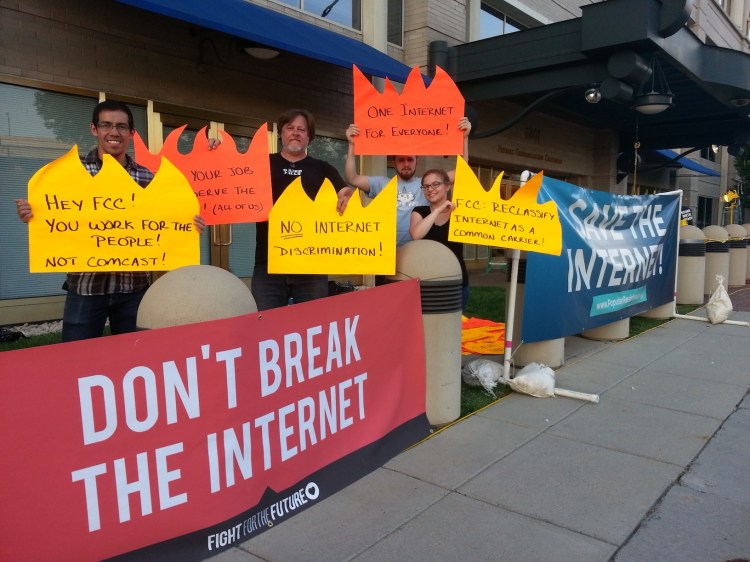SOMEWHERE OVER AMERICA — The sneaky genius of the term “net neutrality” is that it’s pretty hard to oppose it.
Like apple pie, peace, free markets, and democracy, nobody wants to come out against net neutrality. Who could argue with the idea that Internet access should be a right, offered to all without discrimination? Nobody really wants to say publicly that corporations should be able to purchase “fast lane” access to consumers’ screens while relegating non-paying competitors to slow lanes — or no lanes at all.
So when Ted Cruz calls Barack Obama’s statement in support of net neutrality this week “Obamacare for the Internet,” it’s hard not to feel sorry for Cruz. His tweet is clever and quotable but also staggeringly stupid, showing a (probably deliberate) misunderstanding not only of how the Internet works but also how the Affordable Care Act works.
The trouble is that “net neutrality,” while a potent phrase, is nearly content-free. So empty, in fact, that telcos — who are the only significant industry to actually oppose net neutrality, because it would cost them a small fraction of their gigantic profits and provide them with slightly more regulatory oversight — can even come out with a statement in support of net neutrality. They can run street campaigns in favor of an Internet “unbounded by limits, unfettered by rules,” calling it a “wild, free thing.” They can claim to be the true proponents of freedom when what they clearly want is the freedom to charge more for certain types of traffic.
Worse, “net neutrality” is an empty phrase standing in for a truly complex set of technological and regulatory concerns. Some of those regulations are more than 80 years old, such as the key “Title II” designation that’s the core of the current debate. Title II, should the FCC choose to apply it, would give the agency enough oversight over the telcos to enforce some basic tenets of “net neutrality.” Not by weighing down telcos with a smothering pile of regulations, but by giving the FCC a potent weapon to stop telcos from making especially egregious violations of the principle of equal access.
Unfortunately, we live in a country where complex regulatory and technical issues are often argued out through the reductive lens of congressional politics. As a result, Obama’s speech in favor of net neutrality makes the thing sound like a far more aggressive takeover of telco rights than it should be.
In reality, there are already “fast lanes” on the Internet, and have been for over a decade. Companies that want speedier access to their customers can purchase bigger pipes, locate their data centers closer to key exchanges, or utilize content delivery networks (CDNs) that help prioritize their packets and ensure that their data arrives quickly.
If I want Internet access on the JetBlue airplane I’m currently sitting on, JetBlue is happy to give it to me. It’s even offering basic access to me for free, but if I want to pay $9 per hour I can get faster access suitable for streaming media or downloading big files.
Is that a violation of “net neutrality?” Do I have the right to demand the same speed of service as my seatmate, even if she is paying $9 per hour and I’m not? Of course not.
If there’s a fast lane, there’s also a slow lane: Everyone who didn’t purchase faster access is by default on the pokey side. But on the Internet’s backbone, as on my JetBlue flight, this kind of prioritization has been going on for years, and it hasn’t particularly hurt anyone. Most people would be happy for their emails to take a second or two longer to arrive if that means they don’t see buffering or pixelation in their Netflix streams, and indeed, that’s exactly the kind of fast-lane prioritization that the telcos want to preserve.
The question is how far that kind of traffic discrimination can go. The telcos say that we should trust them not to run things too unfairly, because the market will penalize any companies that go too far in blocking or slowing traffic. Plus, they say, the current regulatory climate has given us all this amazing Internet we’ve enjoyed so far.
But that’s a laughable argument coming from companies that can barely get their installers’ vans to show up within a four-hour window at a customer’s house. And, as VentureBeat’s Chris O’Brien recently discovered, Americans’ Internet access is pathetically slow and way too expensive, compared to access in other industrialized countries.
That’s probably because we’ve allowed telcos to capture the market — and their regulators — and run the Internet without much significant competition or serious oversight.
So “net neutrality” is an empty phrase. It doesn’t capture the regulatory reality. But I’m still in favor of it, because, as O’Brien wrote, “Government [in France] has played a strong role in ensuring competition, and that has increased choice and driven down prices for consumers.”
Title II designation, using the terms of a law that predates the Internet by 40 years, is probably a poor tool to help ensure widespread access and vigorous competition among broadband providers. The telcos will probably win this battle anyway, given how much they’ve given to various Congressional candidates.
But expressing support for net neutrality is a start. So if you’re one of the 58 percent of Americans who have no opinion on this topic, it’s time to get off the fence.
VentureBeat's mission is to be a digital town square for technical decision-makers to gain knowledge about transformative enterprise technology and transact. Learn More

